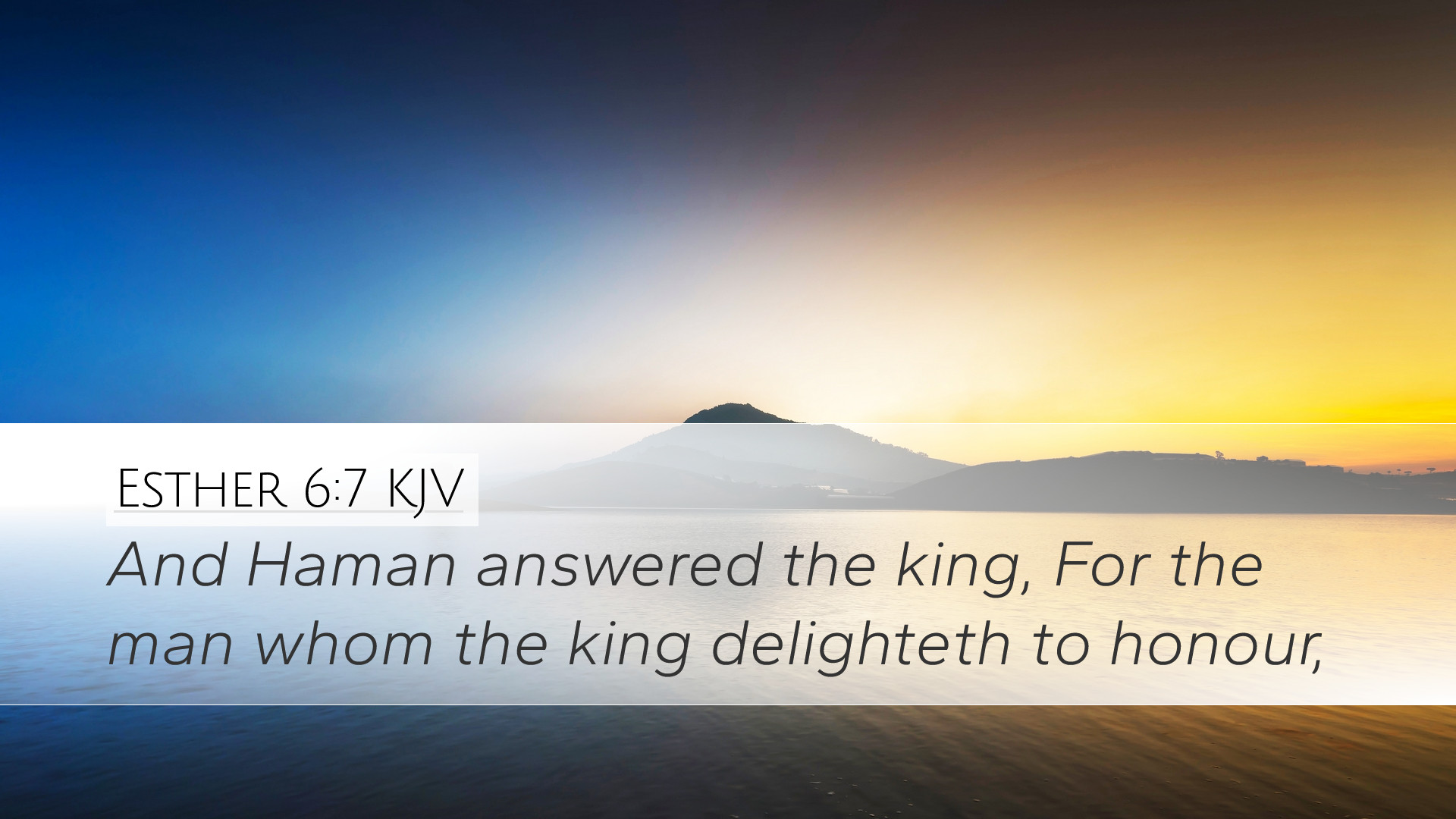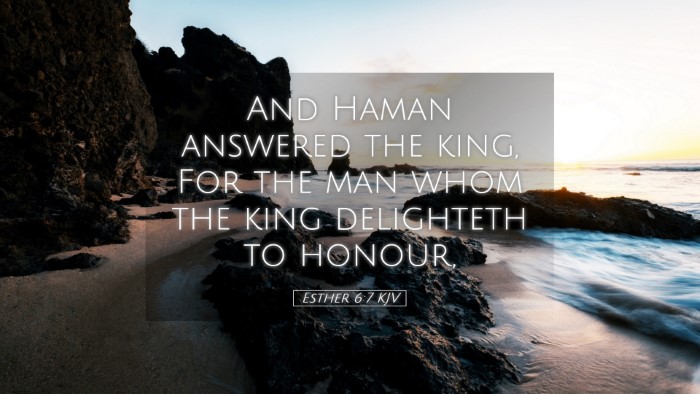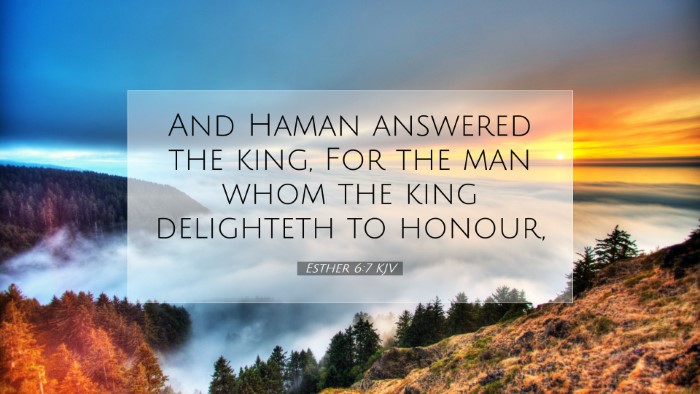Old Testament
Genesis Exodus Leviticus Numbers Deuteronomy Joshua Judges Ruth 1 Samuel 2 Samuel 1 Kings 2 Kings 1 Chronicles 2 Chronicles Ezra Nehemiah Esther Job Psalms Proverbs Ecclesiastes Song of Solomon Isaiah Jeremiah Lamentations Ezekiel Daniel Hosea Joel Amos Obadiah Jonah Micah Nahum Habakkuk Zephaniah Haggai Zechariah MalachiEsther 6:7
Esther 6:7 KJV
And Haman answered the king, For the man whom the king delighteth to honour,
Esther 6:7 Bible Commentary
Commentary on Esther 6:7
Esther 6:7 states: "And Haman said to the king, For the man whom the king delights to honor, let a royal robe be brought which the king has worn, and the horse that the king has ridden, and let the royal crown be set on his head." This verse is pivotal in understanding the unfolding narrative of Esther, as it represents a dramatic turn of events that reveals the providence of God and the juxtaposition between human pride and divine intervention.
Understanding Haman's Proposal
Haman's proposal to the king serves several functions within the text, reflecting both the character of Haman and the larger thematic elements at play:
- Self-Importance and Ambition: Haman proposes a grand honor for the man the king delights in, indicating his own ambition and desire for recognition. This moment highlights the deeper aspect of pride. Matthew Henry notes that Haman's motives are selfish and reveal how ambitious individuals often seek glory at the expense of others.
- Irony and Divine Justice: This request is steeped in irony. Haman, unaware that he is speaking of Mordecai, is unknowingly seeking to honor his enemy. Albert Barnes illustrates that this moment foreshadows Haman's downfall, emphasizing the biblical principle that those who plot evil will find themselves ensnared by their own devices.
- King's Favor: The choice of the royal attire and the king’s horse symbolizes favor. Adam Clarke indicates that these elements reflect the kind of honor that was due to only the most esteemed individuals in the kingdom. Haman’s request reveals his understanding of royal appreciation, but also exposes a critical flaw in his character where he seeks to elevate himself through the downfall of Mordecai.
Theological Reflections
Esther 6:7 raises significant theological reflections that resonate with many biblical themes:
- Providence of God: Throughout the book of Esther, the unseen hand of God plays a crucial role. Matthew Henry mentions that while God’s name is not explicitly mentioned, His providence is evident in the actions of both Haman and Mordecai. This reminds readers of God’s sovereignty over human affairs.
- Contrasts between Pride and Humility: The verse presents a stark contrast between Haman’s prideful ambition and Mordecai’s quiet virtue. Albert Barnes argues that humility is often rewarded even when it appears that pride and arrogance prevail in the short term. This is a recurring theme in scripture and serves as a warning against pride.
- Restoration and Justice: The request made by Haman inadvertently sets the stage for Mordecai’s restoration. Adam Clarke elaborates on how this moment reflects the biblical principle that God’s righteousness will ultimately prevail, erasing the wrongs done to those who are loyal to Him.
Practical Applications for Today
Pastors, students, and scholars can draw several practical applications from Esther 6:7:
- Caution Against Pride: Leaders should be wary of pride and self-importance. Haman’s downfall serves as a reminder that self-aggrandizement can lead to devastating consequences.
- The Importance of Humility: The exaltation of the humble, represented by Mordecai, reinforces the biblical call to humility. Matthew Henry suggests that God often uses the humble to bring about His purposes in the world.
- The Assurance of God’s Justice: Believers can take comfort in the knowledge that God sees the injustices done in this world and has the power to right those wrongs. Barnes and Clarke emphasize that God’s timing may not align with human expectations, but His justice is assured.
- Divine Providence in Our Lives: The complexities of life often leave individuals puzzled about God’s plans. The book of Esther, particularly verses like this one, encourages believers to trust in God’s overarching purpose even in the absence of overt signs of His presence.
Conclusion
Esther 6:7 serves as a dramatic moment in the narrative, encapsulating themes of pride, justice, and the unseen workings of God’s providence. Haman’s desire to honor himself inadvertently leads to the elevation of Mordecai, demonstrating that God can use human folly to fulfill His divine will. Through reflective study of this verse, believers are encouraged to seek humility, trust in God’s justice, and recognize the profound truth that God’s plans often operate beneath the surface of human understanding.


